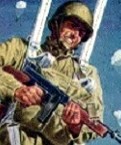grarap
Posts: 15
Joined: 6/1/2008
Status: offline

|
quote:
ORIGINAL: Crimguy
quote:
ORIGINAL: General Quarters
grarap, I know enough about you to know that you are an obviously intelligent guy who likes history, including ACW history. And, although I have not played this game, I know enough about it to guage its level of complexity. On the basis of that, I would be astounded if you have any problem learning this game. I would personally be willing to refund your money if I am wrong. ;)
I think that's well-said. From my perspective (a big wargamer and a decent amateur chess player), wargames are different in many respects than either chess or a game like Civ IV. In chess, you are required to develop certain skills in order to be proficient. Learn a few openings, learn to read the position of the board (with varying success!), develop your ability to calculate a couple moves ahead. All somewhat abstracted as the board does not reflect real life (unless you commute to work on an 8x8 grid). With Civ-style strategy games, you also have to develop certain skills, but again it's using a set of rules that don't necessarily follow life.
With war games, generally, you can approach the game with a certain amount of real-life historical perspective. That will get anyone by the basics of the game itself. You then learn the particulars of the ruleset, which are always created to simulate reality to some extent. To accel, you must then be well acquainted with the rules. Anyone who played ACL knows what I'm talking about ("I killed your infantry squad because Rule 3.5(b)(6) says my panzergrenadier has a special +4 modifier against entrenched soft targets.")
To be a great player, you must be good at the rules and at some type of strategic or tactical thinking.
So, pick a game and run with it. Watch out for War in the Pacific. It's not a game. It's a lifestyle 
That's what I've always imagined wargames to be - a lot of dice rolling and obscure rules. However, I'm having some trouble getting my head around WBTS, simply because there are so few unit types. Maritime battles aside, you just have infantry, cavalry (+ their untrained counterparts) and artillery to play around with. That's why it's all confusing me slightly. Is there really a lot of complexity behind all those units - each with unique strengths and differences against other unit types on different terrain etc? Is it the generals that add a distinct layer of difficulty to the game? Is it the politics? On the surface, WBTS looks deceptively simple, which is why I inquired as to its suitability for somebody who has no real experience in this genre (me  ). ).
< Message edited by grarap -- 6/3/2008 11:21:40 AM >
|
 Printable Version
Printable Version
 ), and so I'm slightly concerned that this game is going to go straight over my head. Can any one of you wargaming veterans or developers reassure me that WbtS is going to be simple to pick up (although not necessarily master) and fun to play for fans of other turn-based strategy games? To those testers (
), and so I'm slightly concerned that this game is going to go straight over my head. Can any one of you wargaming veterans or developers reassure me that WbtS is going to be simple to pick up (although not necessarily master) and fun to play for fans of other turn-based strategy games? To those testers ( ): is the game merely cold, hard logic and maneuvering, or is there real excitement in watching battles unfold and commanding your little troops march around the world map? I really can't wait for the release!
): is the game merely cold, hard logic and maneuvering, or is there real excitement in watching battles unfold and commanding your little troops march around the world map? I really can't wait for the release! 










 ).
).





 New Messages
New Messages No New Messages
No New Messages Hot Topic w/ New Messages
Hot Topic w/ New Messages Hot Topic w/o New Messages
Hot Topic w/o New Messages Locked w/ New Messages
Locked w/ New Messages Locked w/o New Messages
Locked w/o New Messages Post New Thread
Post New Thread